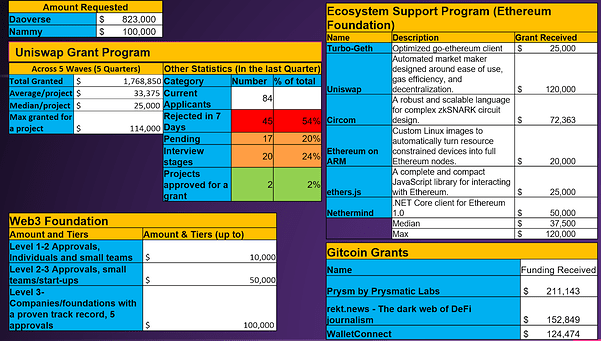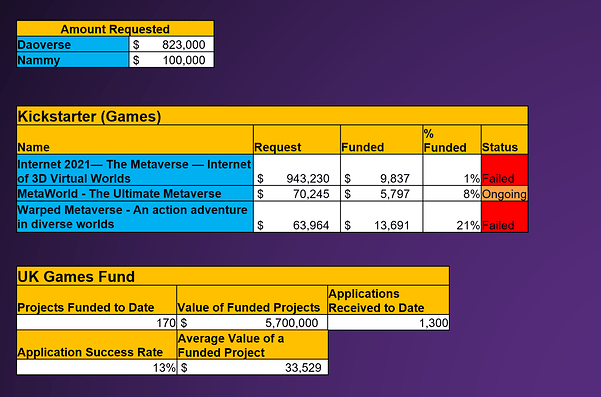Appreciation for the Daoverse and Nammy teams
Firstly, we would like to thank the Daoverse @KuzoIV @Alchimist and Nammy @kenorb teams for taking the lead in being the trailblazers in our governance protocols. It isn’t easy to be at the forefront of such heated debate and it takes a lot of courage to deposit a huge sum of FX in hopes to see their projects come to fruition.
We have the utmost respect for both teams and remain confident that they will continue to strive for excellence and hone their craft despite this initial setback.
Compensation to the Daoverse and Nammy teams
Function X Foundation has refunded the 10,000 FX deposited by both teams. We believe that the refund was only proper.
In so doing, we acknowledge that our requirements for submitting a proposal under the EGF should have been clearer. We are now in the process of specifying the guidelines and processes leading to the disbursement of the EGF Grant. We shall publish our revised guidelines in due course.
However, we would not be refunding other team’s proposals in the future if their proposals are rejected.
The Function X team is committed to building a collaborative ecosystem. Therefore, it is not our intention to distinguish the community from the team. That would contradict our philosophy. We stay committed to our vision of working within a big team to achieve a common goal.
Towards this end, our team has dedicated their time in reviewing and addressing the issues that arose from the recent governance voting. Led by @DavidK and @zaccheah , our team members like @indra and @BlueStitch have been working tirelessly with the community project owners. Such engagement before and during the launch of the proposals will result in better quality products and services to the community.
Statistics and development grants in other blockchain ecosystem
Amounts
Before moving on to discussing how we can improve Function X governance, I would like to just share some statistics across existing grants in the market. Here is just a snapshot.
At the time of request, the amount requested for both projects is about 1 FX to 1 USD. Here is a snapshot of some stats across other blockchain and gaming grants.
Blockchain Grants
Kickstarter & Gaming Grants
There are a few things I would like to highlight here with regards to amount granted and success rate for applicants:
- Max amount across the various grants amount to about $100,000
- The average project across grants is granted $25,000-$40,000
- Application success rate for Uniswap Grant Program (Q4 2021) is 2% out of 84 proposals
- Notable projects from the Ecosystem Support Program and Gitcoin Grants:
- Uniswap: $50,000 + 120 ETH (about $120,000)
- WalletConnect: $124,474
- Ether.js: $25,000
Other Information for the grant applicants to consider
- What does the community stand to gain? This is also vital to protect the entire community’s interest, for example if the proposal owners were creating NFTs, they could commit to airdropping 20% of NFTs to the community. If not there isn’t a guarantee for a team to take the EGF grant money and deploy on another chain without giving back to the community
- Concept testing: Successful applicants would first and foremost have a well-researched and test concept and have some prior work to show.
- Team’s relevant experience to build and deploy a sustainable and workable application: In this industry, deploying a Dapp or applying for bug bounties would require smart contract or blockchain technical skills unless you are just creating an NFT. So first and foremost, accessing the team’s technical capabilities is vital, showcasing a github account.
- Milestones and deliverables: Having clear concise milestones and deliverables is key here, payouts will be made according to each quantifiable milestone made or based on a quantifiable metrics for example “Fully integrated metamask to Dapp” or “Reached/acquired 500 unique users”
- Application process: For successful applicants, the entire application process takes weeks or even months to finalize.
- Fund distribution: Approved funds are made according to each milestone delivery and the full amount will not be disbursed upfront. This is the same applied to FXDM.
Moving forward
According to the discussion and concerns raised by the community, we are exploring the following options to further improve the governance voting mechanism.
-
Quorum to pass the proposal
- Amend the quorum requirement
- Retain the same quorum requirement but the team validators are required to vote and disclose the voting guidelines.
- Retain the same quorum requirement and no team validators are allowed to vote to maintain the neutrality but set up a slashing mechanism to punish the public validators who didn’t vote.
-
Add more specific details to call for a proposal
- Specify the different grant levels and the requirements needed to be considered for that category. Example: Level 2, target: small teams/start-ups, amount: up to $50,000, requirements (if committee based of 6 members) : 3 approvals.
- Additionally specify the different types of categories for example: bug bounties (issues with existing code and proposed solution), building Dapps…
-
Voting in a committee of 6 reviewers to review grant applications
- This suggestion is drawing reference from Uniswap Grants Program
- Have a that reviews grant applications and have a initial budget of $750,000 per quarter
- The budget and committee members will be reviewed every 2 quarters
- Most foundation grants (eg. Web3foundation, Ecosystem Support Program) are managed by a committee of 6-10 members. Members of such committees are typically foundation members and this is a centralized approach. The approach that Uniswap Grant Program takes is a centralized-decentralized governance, allowing the community to vote in a committee to manage the fund.
Additional information and resources:
- Report on grants in blockchain and other grants
- Data file for grant_info
- Nammy proposal discussion
- Daoverse proposal discussion
- YouTube discussion
The above are just suggestions based on the approach that other grants have taken. We would welcome any comments and feedback!

